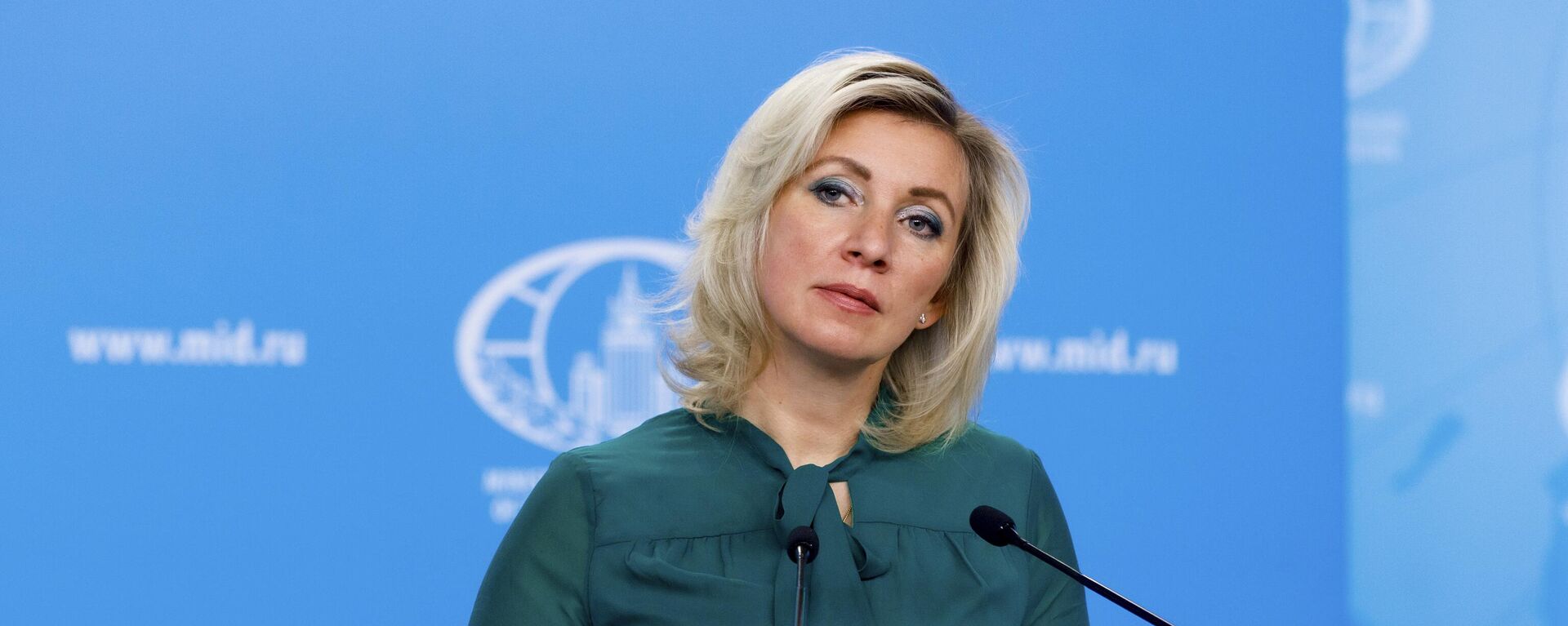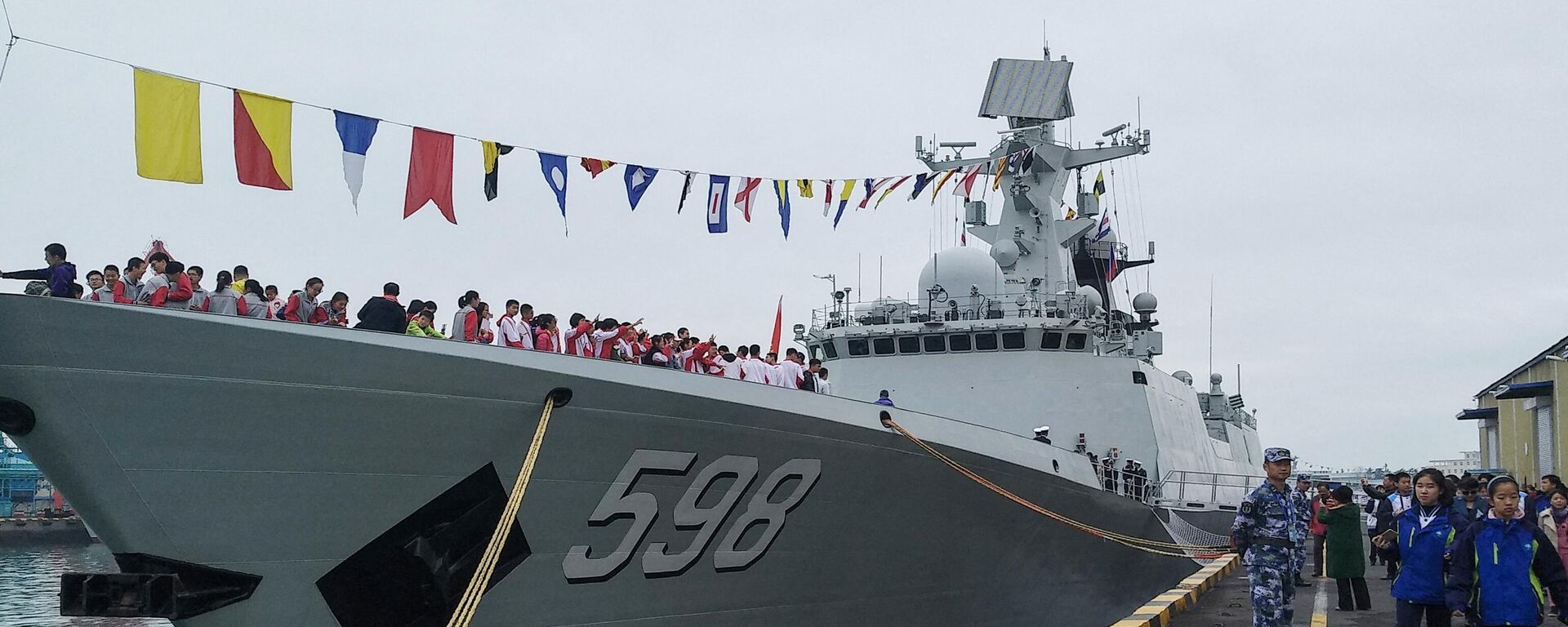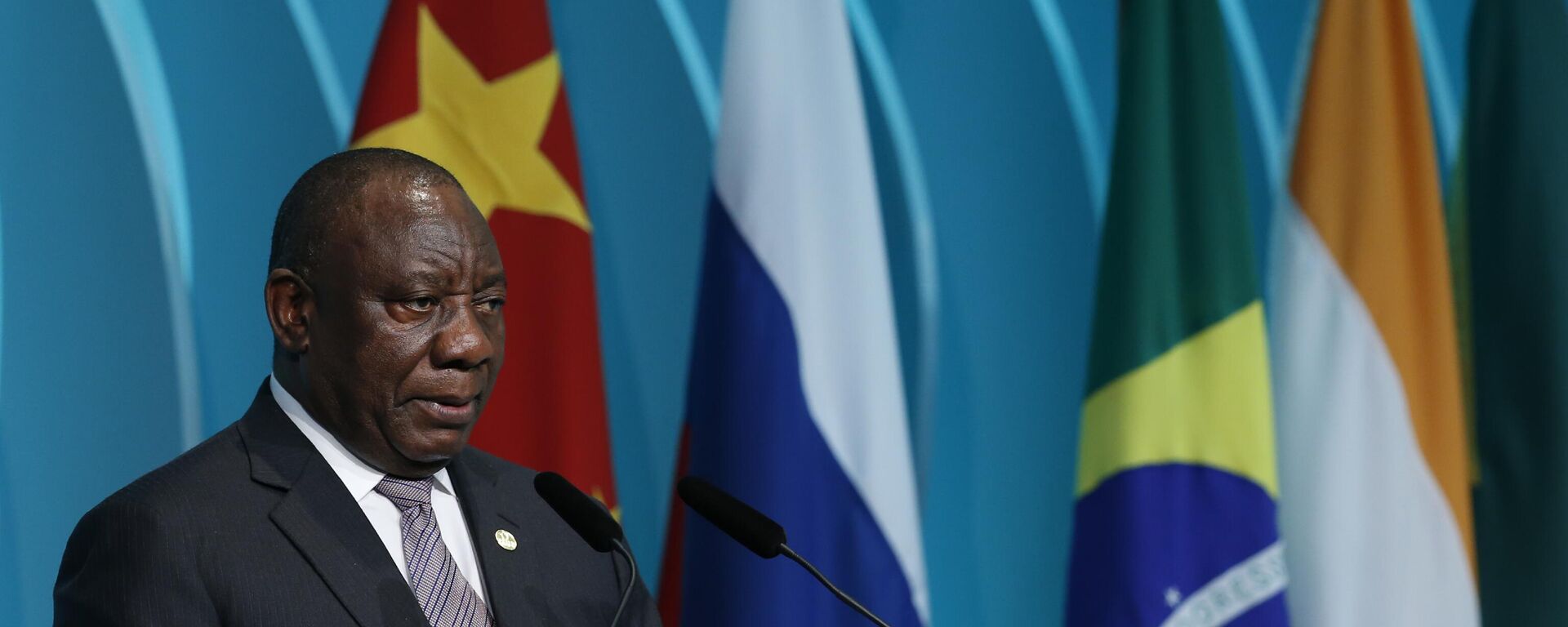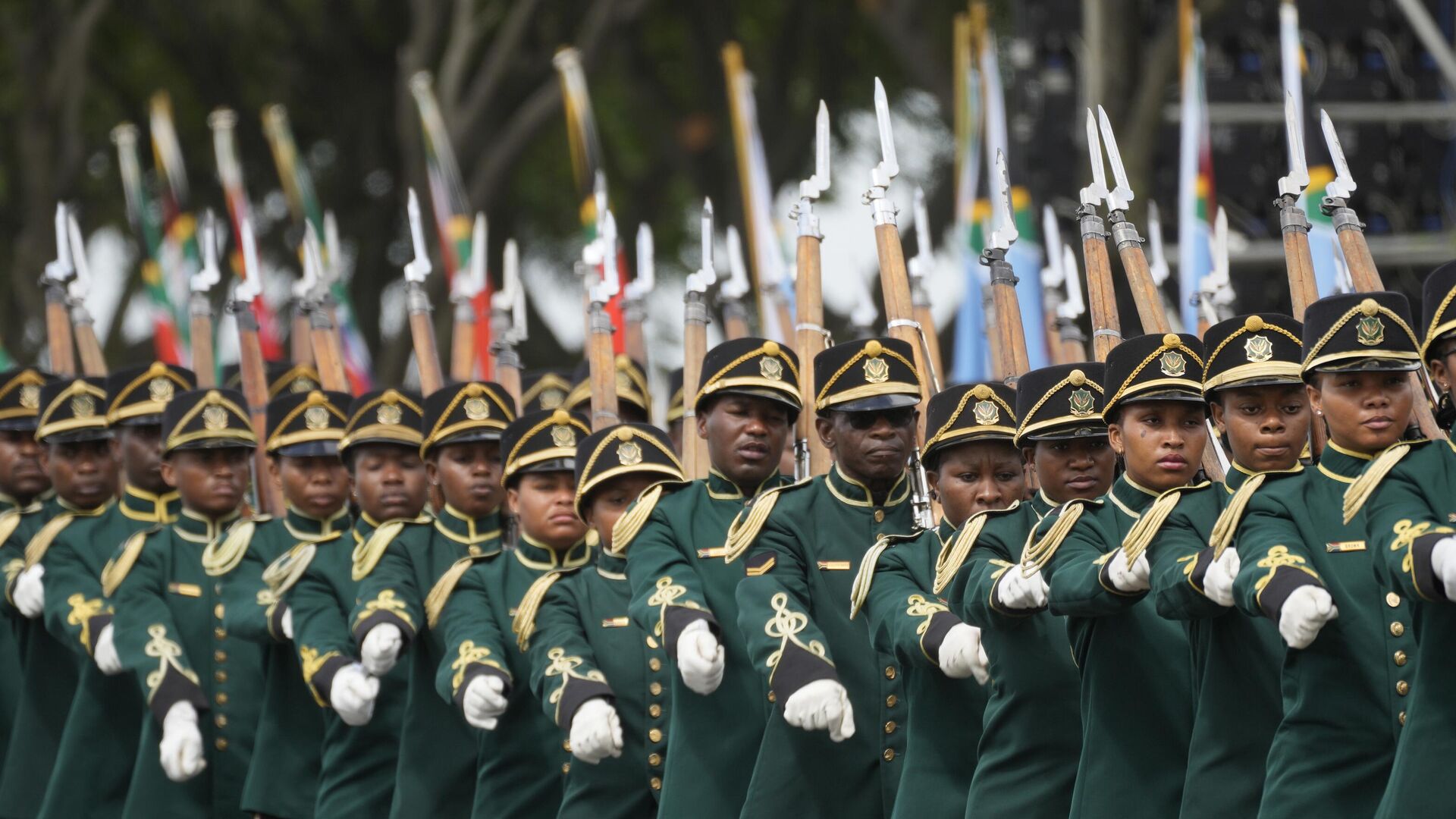https://sputnikglobe.com/20230222/joint-drills-with-russia--china-sign-of-south-africas-independence-experts-say-1107650663.html
Joint Drills With Russia & China Sign of South Africa's 'Independence', Experts Say
Joint Drills With Russia & China Sign of South Africa's 'Independence', Experts Say
Sputnik International
The ongoing joint naval exercises which are held by South Africa, Russia and China are important both from a political and military point of view, given the current situation in the world, an expert has shared with Sputnik.
2023-02-22T03:26+0000
2023-02-22T03:26+0000
2023-02-22T03:26+0000
africa
southern africa
south africa
russia
china
naval drills
https://cdn1.img.sputnikglobe.com/img/07e7/02/15/1107663611_0:148:3133:1910_1920x0_80_0_0_eff781f662b468c983d138d267c2989d.jpg
The ongoing joint naval exercises held by South Africa, Russia and China are important both from a political and military point of view, given the current situation in the world, Russian military expert and political analyst Ivan Konovalov told Sputnik.As for South Africa, Konovalov says such exercises are a very powerful means of raising the status of the country in Sub-Saharan Africa, where Pretoria plays a role in solving regional problems, with the help of its armed forces. Therefore, this is a very serious "grandstanding" for South Africa, including on the international arena.The Russian expert's comments were echoed by Eguegu Ovigwe, a policy analyst specializing in geopolitics and African affairs at Development Reimagined, who underlined that South Africa could benefit from the exercises from a technical standpoint, exchanging experience with major military powers and increasing its domain awareness around its coasts.The naval drills take place at two locations, off the shores of the coastal city of Durban in the province of KwaZulu-Natal and off the city of Richards Bay, which is located 180 kilometers (110 miles) from Durban. The drills are expected to involve six ships and vessels – three Chinese, two Russian and one South African. The three countries' military personnel team-up coincides with South Africa's Armed Forces Day celebration in Richards Bay, uMhlathuze Municipality.In late January, following the announcement of the plans of the South Africa–Russia–China Naval Drills by the South African National Defense Force (SANDF), White House Press Secretary Karine Jean-Pierre said Washington was concerned about the African country participating in military exercises with Russia and China.Western media warned Pretoria risked facing an "embarrassing backlash" due to joining and hosting the Russian-Chinese naval exercises, noting that holding the exercises during Russia's special military operation in Ukraine had Western diplomats privately incensed and publicly critical. The media saw "freezing out Russia" or, at least, postponing the drills as a "smarter choice."As Ovigwe noted, the drills have nothing to do with the Ukraine crisis, despite Western rhetoric.According to Ovigwe, the fact that the drills are taking place signifies the West's efforts to isolate Russia are unsuccessful.In his turn, Konovalov points out that similar exercises, the participants of which are not Western countries, have a strong influence on the regional global alignment of forces. The official noted that such drills are "very serious evidence" of military-political, as well as military-technical cooperation between sovereign nations in the confrontation of the so-called "US hegemony."The analyst also slammed the attempts of the so-called "collective West" to isolate Moscow, arguing that the number of people living in those countries that are strategic partners and allies of Russia is "three-quarters of the world's population."Ovigwe noted the West is discontent with countries such as BRICS members Brazil, Russia, India, China, South Africa for not supporting anti-Russian initiatives – among other things, voting against them or abstaining from voting at the UN General Assembly. The analyst stressed the West exerts pressure on South Africa and other countries because they choose not to pander to those who view Russia as an adversary. In January, the South African National Defense Force stated that it views the trilateral maritime drills as "means to strengthen the already flourishing relations" between Pretoria, Moscow and Beijing.Mzuvukile Maqetuka, South African ambassador to Moscow, in an interview with Sputnik in late January pointed out that the joint South Africa-Russia-China naval exercises have "all chances" of taking place again in 2024 and becoming an annual event.Russian Foreign Minister Sergey Lavrov noted he could not understand why Russia, China and South Africa's joint exercises could cause a "mixed reaction" since US exercises off the coast of China, for instance, do not raise questions from anyone.According to Su Hao, founding director of the Center for Strategic and Peace Studies at China Foreign Affairs University, the joint exercises caused concerns for the Biden administration as the US is afraid of losing control in the Indian Ocean. He noted that Washington considers any close cooperation with China in the territories of the Belt and Road Initiative - and especially along the Maritime Silk Road - a threat.While Russia and China have annually held military naval exercises since 2012, South Africa joined their initiative and hosted their first trilateral naval drills in November 2019. Over the past years, many countries across the world participated in Russian-Chinese military exercises, including Iran, India, Algeria, among other nations.From a military point of view, Konovalov assumes that naval drills along the waters off the South African coasts are of great importance for the Russian Navy so that it can fulfill its mission in various waters across the globe.Noting that the three countries participating in the ongoing Mosi II exercises are BRICS members, Konovalov stated such military cooperation between these states must be held on a regular basis.South Africa joined the BRIC bloc in 2010, after which the organization changed its name to BRICS. Currently, the African country is the BRICS' 2023 chair and will host all the organization's events, including the summit, which will take place in Durban in late August.According to experts, South Africa acts as an example for countries on the African continent wishing to "form a new alliance to break away from Western dominance."As of the present time, BRICS is comprised of five nations although many have expressed their desire to join the organization, with Egypt, Algeria, Iran and Argentina having formally made their application to become members of the bloc. According to South African Ambassador to Russia Mzuvukile Maqetuka, about 13 countries are interested in joining the group.Concerning new members, South Africa's Foreign Minister Naledi Pandor stated earlier in January that the bloc is working on criteria for accepting new members to the organization.
https://sputnikglobe.com/20230125/south-africa-illustrates-wests-failure-to-divide-world-russian-fm-spox-says-1106678988.html
https://sputnikglobe.com/20230221/chinese-naval-fleet-arrives-in-south-africa-for-joint-maritime-drills-with-russia-sa-1107647435.html
https://sputnikglobe.com/20230210/cooperation-between-russia-china-and-south-africa-goes-beyond-economy-expert-says-1107311641.html
africa
southern africa
south africa
russia
china
Sputnik International
feedback@sputniknews.com
+74956456601
MIA „Rossiya Segodnya“
2023
Muhammad Nooh Osman
https://cdn1.img.sputnikglobe.com/img/07e4/08/0e/1080170965_2:0:2050:2048_100x100_80_0_0_1de8233c87df0979e7e74f61b6ffacad.jpg
Muhammad Nooh Osman
https://cdn1.img.sputnikglobe.com/img/07e4/08/0e/1080170965_2:0:2050:2048_100x100_80_0_0_1de8233c87df0979e7e74f61b6ffacad.jpg
News
en_EN
Sputnik International
feedback@sputniknews.com
+74956456601
MIA „Rossiya Segodnya“
Sputnik International
feedback@sputniknews.com
+74956456601
MIA „Rossiya Segodnya“
Muhammad Nooh Osman
https://cdn1.img.sputnikglobe.com/img/07e4/08/0e/1080170965_2:0:2050:2048_100x100_80_0_0_1de8233c87df0979e7e74f61b6ffacad.jpg
joint drills with russia, russia, china, south africa's independence, south africa, naval drills, drills, military exercise, ivan konovalov, durban, richards bay,
joint drills with russia, russia, china, south africa's independence, south africa, naval drills, drills, military exercise, ivan konovalov, durban, richards bay,
Joint Drills With Russia & China Sign of South Africa's 'Independence', Experts Say
Muhammad Nooh Osman
Writer/Editor
On Friday, three-sided naval exercises involving China, Russia and South Africa, dubbed Exercise Mosi ("smoke" in the local Tswana language), was launched off the South African coastal province of KwaZulu-Natal in the Indian Ocean. The 10-day military drills are the second such event involving the three countries since November 2019.
The ongoing joint naval exercises held by South Africa, Russia and China are important both from a political and military point of view, given the current situation in the world, Russian military expert and political analyst Ivan Konovalov told Sputnik.
As for South Africa, Konovalov says such exercises are a very powerful means of raising the status of the country in Sub-Saharan Africa, where Pretoria plays a role in solving regional problems, with the help of its armed forces. Therefore, this is a very serious
"grandstanding" for South Africa, including on the international arena.
"This is an indicator of the independence of this republic, since it is known that the collective West was immediately outraged and began to put serious pressure on South Africa on this subject [the trilateral drills -ed.], for which a rather tough rebuff was received, since South Africa cooperates both in military terms and economically as a sovereign power. Moreover, it cooperates with whomever it considers necessary," Konovalov says.
The Russian expert's comments were echoed by Eguegu Ovigwe, a policy analyst specializing in geopolitics and African affairs at Development Reimagined, who underlined that South Africa could benefit from the exercises from a technical standpoint, exchanging experience with major military powers and increasing its domain awareness around its coasts.
The naval drills take place at two locations, off the shores of the coastal city of Durban in the province of KwaZulu-Natal and off the city of Richards Bay, which is located 180 kilometers (110 miles) from Durban. The drills are expected to involve six ships and vessels – three Chinese, two Russian and one South African. The three countries' military personnel team-up coincides with South Africa's Armed Forces Day celebration in Richards Bay, uMhlathuze Municipality.
In late January, following the announcement of the plans of the South Africa–Russia–China Naval Drills by the South African National Defense Force (SANDF), White House Press Secretary Karine Jean-Pierre said
Washington was concerned about the African country participating in military exercises with Russia and China.
Western media warned Pretoria risked facing an "embarrassing backlash" due to joining and hosting the Russian-Chinese naval exercises, noting that holding the exercises during Russia's special military operation in Ukraine had Western diplomats privately incensed and publicly critical. The media saw "freezing out Russia" or, at least, postponing the drills as a "smarter choice."

25 January 2023, 09:30 GMT
As Ovigwe noted, the drills have nothing to do with the Ukraine crisis, despite Western rhetoric.
"South Africa, China and Russia do not have a joint enemy, so the West might try to characterize this military exercises as insensitive to the conflict in Ukraine. But what they are not doing is to define it as military exercises targeting their interests. And that is because they know that this exercise is actually exclusive of any issues that Russia might have with the West – or China might have. ...This is mostly within these three countries working more closely ... to deepen the military and cooperation," he said.
According to Ovigwe, the fact that the drills are taking place signifies the West's efforts to isolate Russia are unsuccessful.
"So in terms of the Western response, I think the West [is] trying to paint Russia as a pariah. Of course, Russia is countering such narrative by taking on massive diplomatic efforts across the world, particularly in African countries. And this exercise is part of ... signaling that [Russia is] not isolated, more specifically from the Western side," the analyst notes.
In his turn, Konovalov points out that similar exercises, the participants of which are not Western countries, have a strong influence on the regional global alignment of forces. The official noted that such drills are "very serious evidence" of military-political, as well as military-technical cooperation between sovereign nations in the confrontation of the so-called "US hegemony."
"In fact, it's rather ridiculous to talk about this hegemony, but, nevertheless, the US still thinks that this is so. And, accordingly, their NATO allies also do," Konovalov stated.
The analyst also slammed the attempts of the so-called "collective West" to isolate Moscow, arguing that the number of people living in those countries that are strategic partners and allies of Russia is "three-quarters of the world's population."
"Europe is not the whole world," he highlighted.
Ovigwe noted the West is discontent with countries such as BRICS members Brazil, Russia, India, China, South Africa for not supporting anti-Russian initiatives – among other things, voting against them or abstaining from voting at the UN General Assembly. The analyst stressed the West exerts pressure on South Africa and other countries because they choose not to pander to those who view Russia as an adversary.
The Western pressure on South Africa will continue, he notes, whereas the country "continues to maintain its foreign policy based on what it considers to be in its interests".
In January, the South African National Defense Force stated that it views the trilateral maritime drills as "means to strengthen the already flourishing relations" between Pretoria, Moscow and Beijing.
"The joint exercise will help further promote defense and security cooperation between BRICS countries and enhance the capacity of participating parties to jointly safeguard maritime security," the SANDF said.
Mzuvukile Maqetuka, South African ambassador to Moscow, in an interview with Sputnik in late January pointed out that the joint South Africa-Russia-China naval exercises have "all chances" of taking place again in 2024 and becoming an annual event.

21 February 2023, 11:09 GMT
Russian Foreign Minister Sergey Lavrov noted he could not understand why Russia, China and South Africa's joint exercises could cause a "mixed reaction" since US exercises off the coast of China, for instance, do not raise questions from anyone.
According to Su Hao, founding director of the Center for Strategic and Peace Studies at China Foreign Affairs University, the joint exercises caused concerns for the Biden administration as the US is afraid of losing control in the Indian Ocean. He noted that Washington considers any close cooperation with China in the territories of the Belt and Road Initiative - and especially along the Maritime Silk Road - a threat.
While Russia and China have annually held military naval exercises since 2012, South Africa joined their initiative and hosted their first trilateral naval drills in November 2019. Over the past years, many countries across the world participated in Russian-Chinese military exercises, including Iran, India, Algeria, among other nations.

10 February 2023, 15:40 GMT
From a military point of view, Konovalov assumes that naval drills along the waters off the South African coasts are of great importance for the Russian Navy so that it can fulfill its mission in various waters across the globe.
"There are such important moments as the fight against piracy. And this is extremely important for this region. And in the fight against piracy in African waters, both Russia and China are involved," he says. "Also the interaction of the fleets, interaction in the case of various natural disasters. For Africa, this, of course, is relevant."
Noting that the three countries participating in the ongoing Mosi II exercises are BRICS members, Konovalov stated such military cooperation between these states must be held on a regular basis.
"The military cooperation of the three countries of this bloc is a very important factor," he says. "It is necessary that these exercises take place as if on a permanent basis."
South Africa joined the BRIC bloc in 2010, after which the organization changed its name to BRICS. Currently, the African country is the BRICS' 2023 chair and will host all the organization's events, including the summit, which will take place in Durban in late August.
According to experts, South Africa
acts as an example for countries on the African continent wishing to "form a new alliance to break away from Western dominance."
As of the present time, BRICS is comprised of five nations although many have expressed their desire to join the organization, with Egypt, Algeria, Iran and Argentina having formally made their application to become members of the bloc. According to South African Ambassador to Russia Mzuvukile Maqetuka, about 13 countries
are interested in joining the group.
Concerning new members, South Africa's Foreign Minister Naledi Pandor stated earlier in January that the bloc is working on criteria for accepting new members to the organization.






